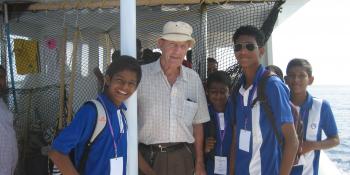
The terminology and practice of "volunteering for development" have evolved over time, with varied interpretations among stakeholders. While substantial research has focused on international volunteer experiences, there is a notable gap in understanding the experiences of local and national volunteers, who often work with limited resources in complex environments.
Evidence is crucial for volunteer-involving organisations to assess their impact and improve volunteer management systems, including duty of care, planning, monitoring, and impact measurement.
Implementation of effective systems can enhance volunteer impact, particularly in fragile contexts, highlighting the need for comprehensive metrics to benchmark volunteering practices, identify gaps, and address challenges.
VSO is a leading organisation in this field, collaborating with academic institutions to enhance the evidence base for its programs. Collaborations with institutions like the Institute of Development Studies (IDS) and Northumbria University have provided insights into volunteering's role in sustainable development through case studies in countries like Kenya, Mozambique, Nepal, the Philippines, Tanzania, and Uganda.
These partnerships help integrate theoretical knowledge into practical assessments of volunteering practices, thereby strengthening cross-sectoral solidarity. Academic institutions play a crucial role in independently evaluating and disseminating knowledge about the impact of volunteering.
A recent partnership with Thammasat University in Thailand has focused on understanding volunteering practices in VSO-supported projects, particularly in lower-resourced and dynamic environments. This collaboration has identified "duty of care" as a critical area needing attention.
The projects assessed involved diverse organisations, including youth networks and community-based organisations, familiar with the Global Volunteering Standard. Using standardised metrics helps pinpoint areas requiring urgent attention and track progress in addressing capacity gaps, especially in fragile contexts affected by crises like climate change and conflict.
As the volunteering ecosystem increasingly integrates international, national, and community volunteers, improving the ability to respond to rapidly changing circumstances is essential.
Effective volunteer management systems and understanding the impact of volunteer efforts on the communities served are crucial. Strengthening organisational capacities, particularly for smaller, resource-limited entities, ensures these systems function effectively.
Collaborating with national and community volunteers on project assessments has helped bridge the gap between theory and practice. Thammasat University's contextualised research offers broader insights and recommendations to enhance volunteering quality and administration. This strengths-based approach fosters solidarity among volunteers and partners, building a comprehensive understanding of impactful volunteering conditions.
Research institutions can advance practice-based research, exploring new areas within global development and volunteering. Addressing capacity, learning, and ownership challenges is vital for capturing effective volunteering inputs and contributing meaningfully to the Sustainable Development Goals.
The iterative approach of partnerships between practitioners like VSO and researchers has proven effective in realising responsible and impactful volunteering practices.
Read more

Transforming lives through education: Geoffrey’s VSO legacy
With a deep belief in the transformative power of education, Geoffrey from Norfolk, UK, has devoted his life both in the UK and abroad to making education more accessible for all.
